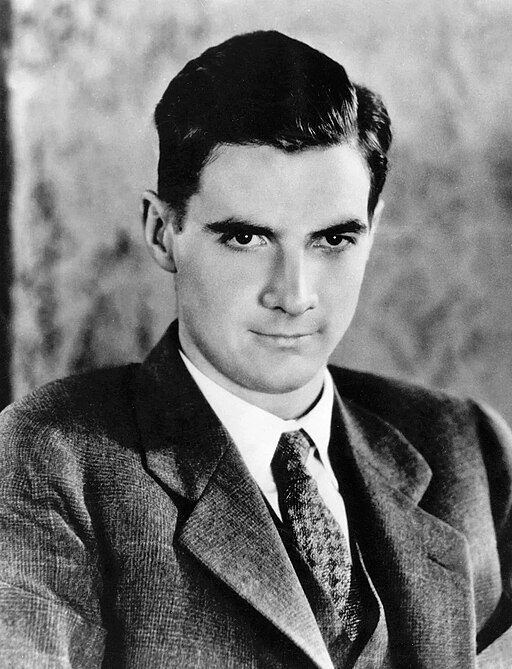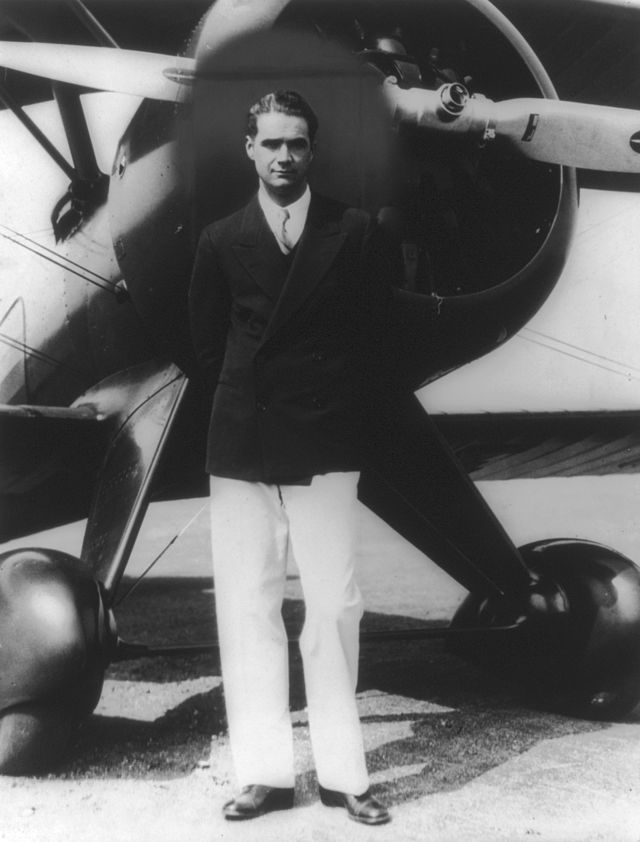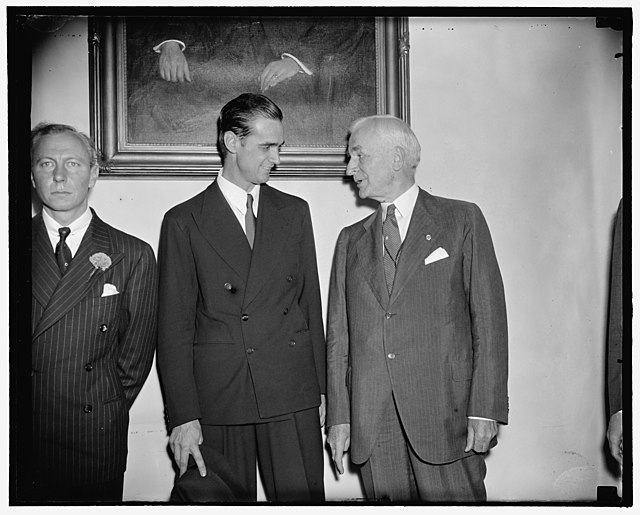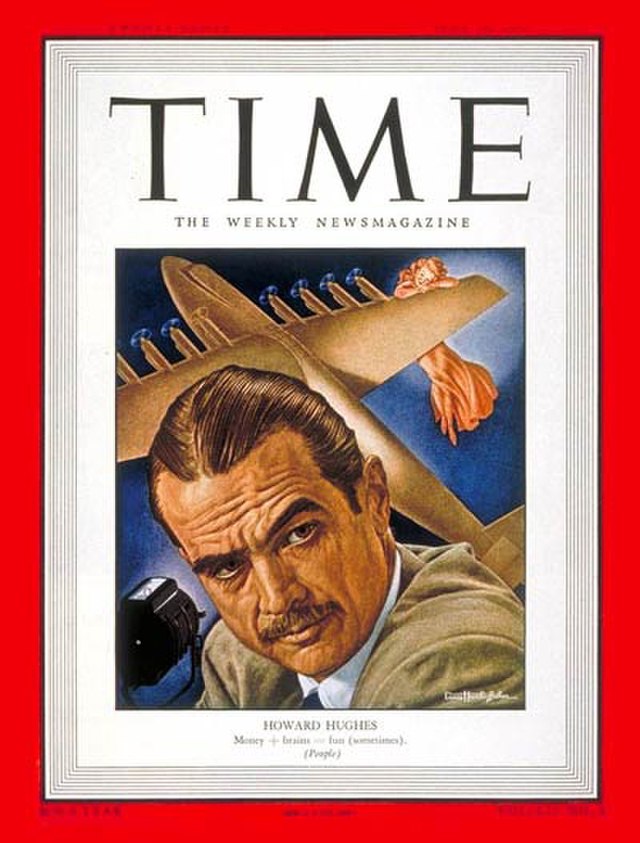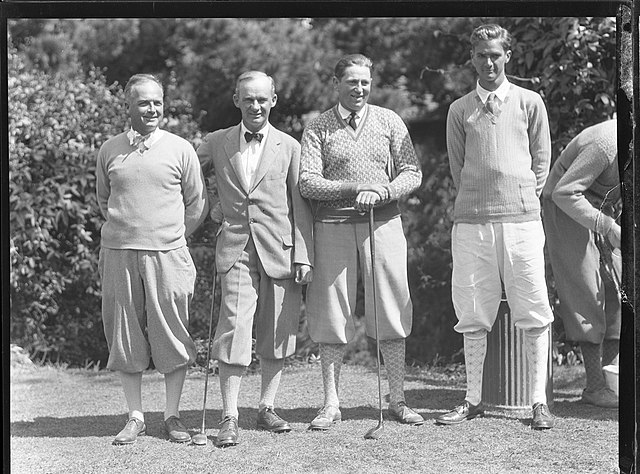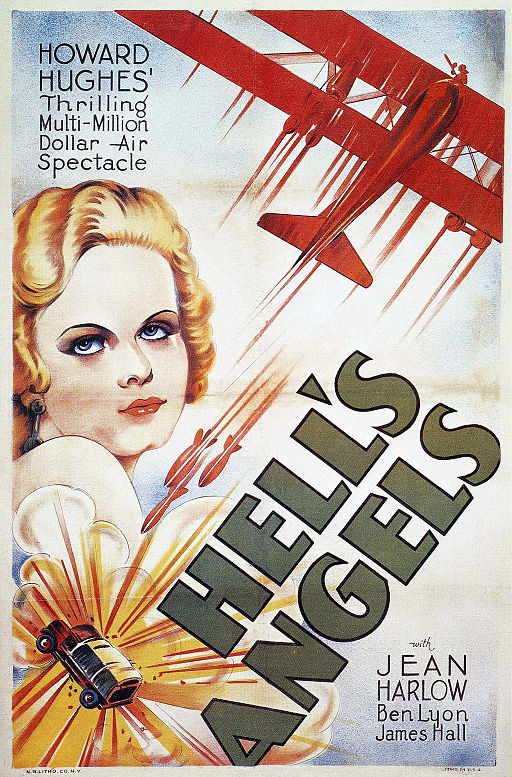Howard Hughes
back| Full Name | Howard Robard Hughes Jr. |
| Born | December 24, 1905 |
| Birthplace | Houston, Texas, USA |
| Died | April 5, 1976 |
| Buried | Glenwood Cemetery, Houston, Texas, USA |
| Married to | Ella Rice (1925–1929) - Jean Peters (1957–1971) |
| Children | None |
| Notable films | Hell's Angels (1930) - Scarface (1932) - The Outlaw (1943) |
Howard Hughes
The Aviator
Howard Hughes (1905-1976) was an American business magnate, aviator, and film director known for his significant impact on Hollywood and aviation. Born in Houston, Texas, Hughes inherited his family's tool company and expanded it into a major corporation.
In film, he directed notable works like Hell's Angels (1930), renowned for its groundbreaking aerial scenes, and produced classics such as Scarface (1932) and The Outlaw (1943). His insistence on realism and technical innovation pushed the boundaries of filmmaking.
Related
Howard Hughes
Biography and his Career as Movie Director:
Howard Hughes, born on December 24, 1905, in Houston, Texas, was an American business magnate, investor, record-setting pilot, engineer, film director, and philanthropist, known during his lifetime as one of the most financially successful individuals in the world. He inherited his father's tool company and expanded it into a major corporation. However, his interests and talents extended far beyond business.
Hughes’ foray into the film industry began in the late 1920s. His first major success was Hell's Angels (1930), an ambitious World War I aerial epic. Hughes directed the film himself, pushing for unprecedented realism and spectacle, which included filming many aerial scenes himself. The film's production was notoriously long and expensive, but it became a significant box office success, marking Hughes as a notable director and producer in Hollywood.
In 1932, Hughes produced Scarface, a groundbreaking gangster film directed by Howard Hawks. The film was a stark portrayal of the violent world of organized crime and became highly influential in the genre. Despite facing censorship issues due to its explicit content, Scarface was critically acclaimed and further cemented Hughes' reputation as a maverick producer willing to tackle controversial subjects.
One of Hughes' most controversial films was The Outlaw (1943), which he directed and produced. The film starred Jane Russell and was noted for its provocative content, especially regarding Russell's sensual portrayal. Hughes' insistence on highlighting Russell's figure led to clashes with the Hollywood Production Code, resulting in delays and edits before its release. The publicity surrounding these battles helped make The Outlaw a financial success despite mixed reviews.
Hughes’ later years in filmmaking were marked by a decline in his direct involvement in movies, as his interests turned more toward aviation and other industries. He acquired control of RKO Pictures in the late 1940s but did not significantly impact its film output before selling the studio in the 1950s.
Hughes’ personal life was as dramatic as his professional one. He was known for his reclusive nature and eccentric behavior, particularly in his later years when he suffered from severe obsessive-compulsive disorder and chronic pain. Despite these challenges, his impact on the film industry remains significant, and his movies, particularly Hell's Angels and Scarface, are considered classics of American cinema.
Howard Hughes passed away on April 5, 1976, from kidney failure. He was buried in Glenwood Cemetery in Houston, Texas. Hughes' legacy as a pioneering filmmaker, aviator, and entrepreneur endures, reflecting his remarkable versatility and indomitable spirit.
Documentary on Howard Hughes:
Innovative Directing Style of Howard Hughes:
Howard Hughes' directing style can be analyzed through several key aspects that marked his approach to filmmaking. Despite his relatively small directorial output, his influence and unique style were quite notable:
Key Aspects of Howard Hughes' Directing Style:
- Technical Innovation and Realism:
Hell's Angels is a prime example of Hughes' commitment to technical excellence and realism. He employed cutting-edge technology and techniques for aerial photography, including the use of real aircraft and innovative camera mounts. His insistence on realism extended to the point where he personally flew planes to capture authentic aerial combat footage.
Hughes' pursuit of technical innovation often meant that production costs and timelines ballooned, but it also resulted in groundbreaking cinematic achievements that pushed the industry forward.
- Visual Spectacle:
Hughes had a flair for grand, visually impressive scenes. In Hell's Angels, the large-scale dogfights and aerial maneuvers were crafted to captivate audiences with their scope and realism.
This focus on visual spectacle is also evident in The Outlaw, where the cinematography emphasizes sweeping landscapes and dramatic compositions, enhancing the film's epic feel.
- Attention to Detail:
Hughes was known for his meticulous attention to detail, which often translated into long and arduous production processes. This is most famously illustrated by the numerous retakes and extensive reshoots in Hell's Angels, including the transition from a silent film to a "talkie," which required additional dialogue recording and synchronization.
His perfectionism could sometimes be seen as obsessive, but it resulted in highly polished final products that were visually and technically superior.
- Controversial Content and Pushing Boundaries:
Hughes was not afraid to push the boundaries of acceptable content in his films. The Outlaw is a notable example, where the provocative portrayal of Jane Russell challenged the Hollywood Production Code. Hughes’ focus on her sexuality and the resultant censorship battles highlighted his willingness to confront societal norms and censorship standards.
This rebellious streak can also be seen in Scarface, which, although directed by Howard Hawks, was heavily influenced by Hughes' vision. The film's violent and unflinching portrayal of gangster life was controversial and groundbreaking for its time.
- Innovative Marketing and Publicity:
Hughes was a master of using controversy and public interest to market his films. The censorship battles over The Outlaw and the public's fascination with Jane Russell's screen persona generated significant publicity, making the film a commercial success despite mixed critical reception.
His ability to harness media attention and public curiosity played a significant role in the financial success of his films.
- Focus on Strong, Independent Women:
In his films, Hughes often highlighted strong and independent female characters. Jane Russell's character in The Outlaw is a prime example, portrayed with a level of sexual autonomy and strength that was unusual for the time.
This focus on powerful female roles was both a reflection of Hughes' personal preferences and a way to attract audience interest through controversial and bold characterizations.
Conclusion:
Howard Hughes' directing style was characterized by a relentless pursuit of technical excellence, a penchant for visual spectacle, and a willingness to challenge societal norms and censorship. His meticulous attention to detail and innovative approach to filmmaking set new standards in the industry, and his ability to generate publicity ensured that his films reached wide audiences. Despite the relatively small number of films he directed, Hughes' impact on the film industry was significant and lasting, reflecting his unique vision and uncompromising dedication to his craft.
Awards and Recognition:
Howard Hughes, despite his significant influence and contributions to the film industry, did not accumulate a large number of formal awards and nominations. His career spanned many roles, including producer, director, and aviator, and his recognition often came through industry impact rather than traditional award circuits. Here's an overview of his notable accolades and recognitions:
Awards and Recognitions:
Academy Awards (Oscars):
- Two Arabian Knights (1927)
Award: Academy Award for Best Director of a Comedy Picture (Lewis Milestone, Director)
Note: Hughes produced this film, and it was notable for winning in a category that was only awarded at the 1st Academy Awards.
- The Racket (1928)
Nomination: Academy Award for Best Picture
Note: Hughes produced this film, which was nominated for Best Picture at the 1st Academy Awards.
Other Recognitions:
- Hell's Angels (1930)
Although "Hell's Angels" did not receive formal award nominations, it was highly acclaimed for its groundbreaking special effects and aerial cinematography, significantly influencing the war film genre.
- Scarface (1932)
Produced by Hughes, "Scarface" is widely regarded as one of the greatest gangster films of all time and has been preserved in the United States National Film Registry for being "culturally, historically, or aesthetically significant."
Aviation Awards and Recognitions:
Hughes was also renowned for his achievements in aviation, which garnered him various awards and recognitions outside the film industry. His aviation milestones included setting multiple airspeed records and receiving accolades such as:
Collier Trophy (1938) for his contribution to aviation.
Harmon Trophy (1936, 1938) for the world's most outstanding aviator.
Legacy Honors:
- Hollywood Walk of Fame:
Hughes was posthumously awarded a star on the Hollywood Walk of Fame, recognizing his impact on the entertainment industry.
- National Aviation Hall of Fame (1973):
Hughes was inducted into the National Aviation Hall of Fame, honoring his contributions to aviation as a designer, pilot, and record-breaker.
Personal Quotes from Howard Hughes:
On Innovation and Risk:
- "Do the impossible, because almost everyone has told me my ideas are merely fantasies."
- "Once you consent to some concession, you can never cancel it and put things back the way they are."
On Aviation:
- "I want to be remembered for only one thing: my contribution to aviation."
- "I have my own set of values, my own way of thinking. I don’t have time to care about the opinion of others. If I want to fly, I will."
On Wealth and Success:
- "Money can't buy happiness, but it can make you awfully comfortable while you're being miserable."
On Challenges and Perseverance:
- "Passion will make you crazy, but is there any other way to live?"
- "Every man has his price, or a guy like me couldn't exist."
On Privacy and Isolation:
- "I'm not a paranoid deranged millionaire. Goddammit, I'm a billionaire."
- "I intend to leave Hollywood and live in my own world. Hollywood is a place I could never be comfortable in, to work in or to live in."
Movies Directed by Howard Hughes:
Howard Hughes directed a total of four feature films during his career.
-
Swell Hogan (1926)
This film is largely considered lost and was Hughes' first attempt at directing. Little is known about the plot as it was never officially released, reportedly due to poor quality. -
Hell's Angels (1930)
Set during World War I, this epic film follows two brothers who join the Royal Flying Corps. The movie is renowned for its groundbreaking aerial combat sequences and impressive special effects. The production was marked by Hughes' insistence on realism, including the use of real airplanes and dangerous stunts. The film became a major success and is considered a classic in aviation cinema. -
The Age for Love (1931)
A romantic comedy based on the play by Reginald Berkeley, it tells the story of a football star who retires to pursue a career in advertising and falls in love. The film did not achieve the success Hughes hoped for and is not as well-remembered as his other works. -
The Outlaw (1943)
This Western film focuses on the story of Billy the Kid, Pat Garrett, and Doc Holliday, with a notable emphasis on Billy's romantic relationship with Rio, played by Jane Russell. The film became famous due to the controversy over its sexual content, particularly the way Jane Russell was portrayed, which led to conflicts with the Hollywood Production Code.
Additional Notes:
The Racket (1928) and Two Arabian Knights (1927)**: While Hughes was deeply involved in the production of these films, he did not officially direct them. However, he is often credited with significant contributions to their direction, particularly through his influence and financial backing.
Howard Hughes' directorial career was relatively brief but impactful, with Hell's Angels standing out as his most significant contribution to cinema. His insistence on technical perfection and his willingness to challenge Hollywood norms left a lasting mark on the film industry.

